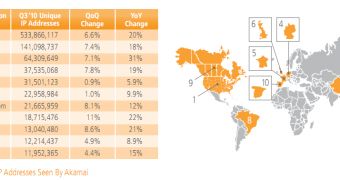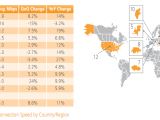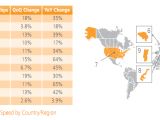Akamai has released its quarterly State of the Internet report for the third quarter of 2010. Unsurprisingly, internet adoption and average broadband speeds all grew, but there were some drops as well, in certain regions. The US is still the biggest country in the number of unique IP addresses. In terms of speed though, South Korea and Japan lead the way.
"The United States and China were once again responsible for a combined 38% of observed IP addresses in the third quarter. Despite strong quarterly and yearly growth seen in both countries, this level has remained rather consistent over the last year," Akamai writes.
The US had 141 million unique IP addresses, an 18 percent increase over the previous year. Meanwhile, there were 64 million unique IPs in China, a 30 percent rise.
Of course, unique IPs don't equal the number of internet users in a country. One address may be used by a large number of people and, at the same time, a user may have several IP addresses on different devices.
Akamai estimates there were over one billion people connecting to its servers in Q3 2010. Globally, the number of IP addresses grew by 20 percent, year over year.
When it comes to average connection speeds, South Korea continues to dominate, despite a big drop in Q3 - average speed declined 15 percent from the previous quarter, reaching 14 Mbps.
Hong Kong followed with 9.2 Mbps then Japan with 8.5 Mbps. The top country in Europe, Romania, came in only fourth globally, with a 7 Mbps average broadband connection. The US rose to the 12th spot with 5.0 Mbps.
By cities, Asia, basically Japan and South Korea, dominates the top 100. The first 47 spots are divided between cities from the two countries, with Hong Kong coming in at 46.
Constanta, Romania is the first city outside of Asia, at the 48th spot with an average speed of 8.8 Mbps. San Jose, California is the first US city to make an entrance, at number 53.

 14 DAY TRIAL //
14 DAY TRIAL // 

